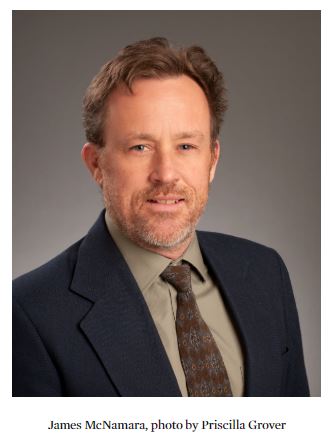
A Boise State University hydrologist is the recipient of the 2022 Jean’ne M. Shreeve National Science Foundation (NSF) Established Program to Stimulate Competitive Research (EPSCoR) Research Excellence Award. James McNamara, a professor in Boise State’s Department of Geosciences, received the award during October’s 2022 Idaho NSF EPSCoR meeting in Boise.
The award recognizes the accomplishments of faculty members at Boise State University, Idaho State University, University of Idaho and other state institutions of higher education who have been active participants in the NSF EPSCoR program. McNamara’s significant body of published works in hydrology and contributions to Boise State programming, facilities, and students over the course of his 25-year career with the institution were key factors in his selection.
Perhaps chief among those contributions was establishing and overseeing the evolution of the university’s Dry Creek Experimental Watershed. Located about 10 miles northeast of Boise, Dry Creek represents nearly 7,000-acres of living laboratory for research and education in watershed sciences operated by Boise State University. Its primary purpose is to provide continuous and distributed hydrometeorological and geographical data for researchers and educators, and it serves as a good representation of western high desert climates in general.
Its creation and evolution have spanned nearly the entirety of McNamara’s career in academic science. He placed the site’s first measuring instruments in 1999 with help from a small grant. Then in 2006, one of several Idaho NSF EPSCoR grants McNamara secured over the years enabled his team to enhance on-site instrumentation significantly by adding new weather stations and stream gauging stations. According to McNamara, continuous collection of this baseline data over the years–all of which is publicly available–supports other researchers conducting more focused studies.
“It’s been this community resource for scientists, but then it’s also used a lot in education for laboratory assignments and classes for students,” he said.
As the site’s capabilities have evolved, so has interest among researchers from other disciplines–such as biology and civil engineering–who can tap into historical data to help answer a variety of questions. McNamara is also encouraged by new faculty members who he says have taken up the mantle to keep up the site and are now educating groups about Dry Creek.
“When you have people out there working the site, it attracts people and becomes this bigger thing,” he said. “It’s encouraging for me because it’s become this site beyond me. I’m happy that I can just sort of fade away, and it’ll just be a site independent of anything I’ve even done.”
McNamara has published nearly 100 peer-reviewed manuscripts and his works have been cited more than 6,000 times. He is the founder of Boise State’s Master’s Degree Program in Hydrologic Sciences, was a key architect in the development of its first two doctorate programs, and served as Chair of the Department of Geosciences for seven consecutive years.
McNamara expressed his appreciation, not only for the recognition from Idaho NSF EPSCoR, but for the consistent support the organization has provided, enabling him to be successful over the years.
“It means a lot,” said McNamara. “There’s no doubt that it enabled me to have a seat at the national and international stages in my particular field of research. As far as acknowledgements, I think one important one is (Idaho EPSCoR Project Administrator and Assistant Project Director) Rick Schumaker. Over the years, through any conflicts and all of the growth, he’s always been there. Rick has just been an outstanding resource for the state.”
McNamara also thanked all his colleagues, faculty, staff and students for their work and involvement throughout his career.
Jim/James McNamara, Geoscience, faculty/staff, studio portrait by Priscilla Grover